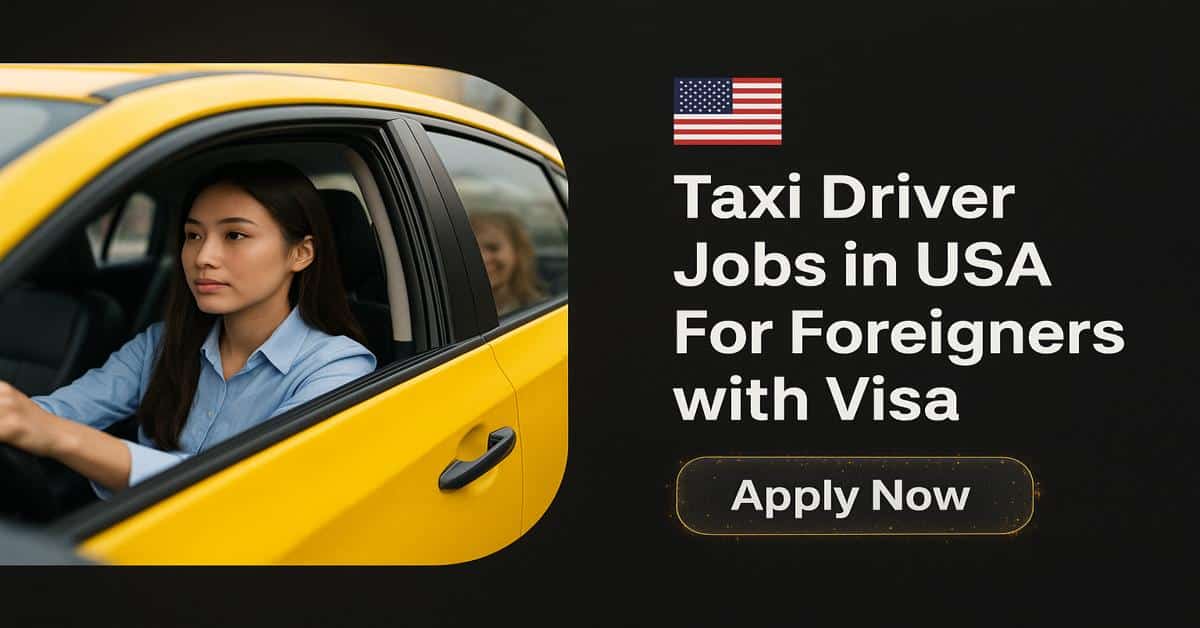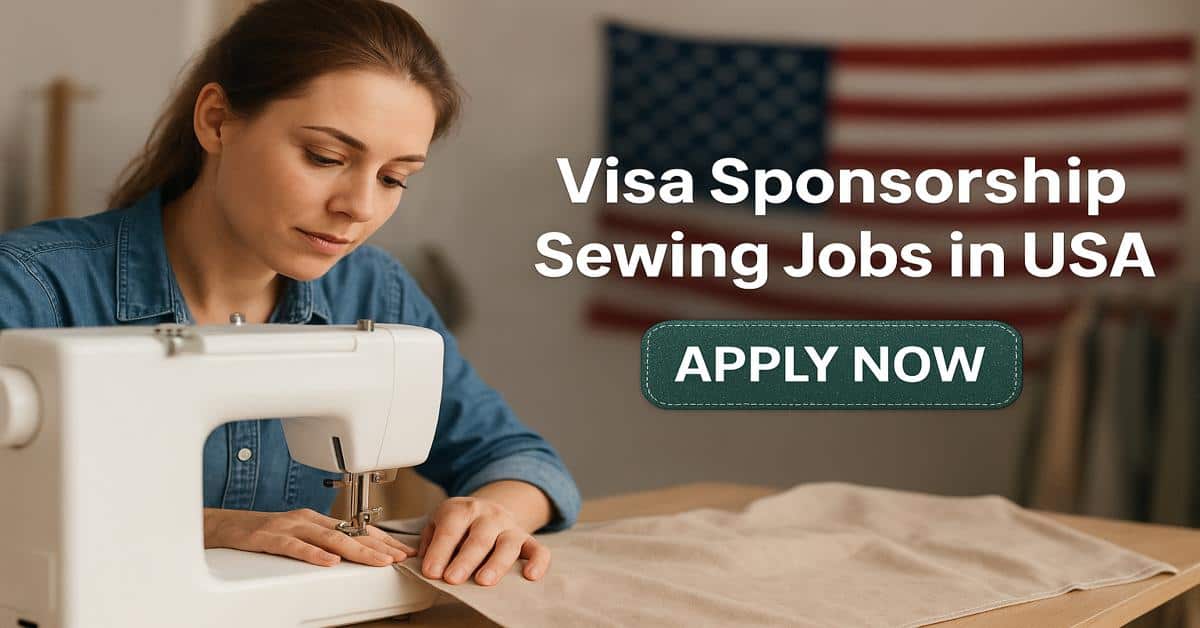E-3 Visa Sponsorship Jobs in USA 2025 – Apply Now
International professionals are drawn to the United States for employment purposes on account of its robust economy and diverse array of employment opportunities. E-3 visa applicants who are non-citizens seeking employment in the United States are granted a singular opportunity. The E-3 visa, its potential applications, and the process of locating sponsoring employment in the United States will be examined.
What is an E-3 Visa?
E-3 visas are nonimmigrant visas designed specifically to authorize Australian nationals to work in the United States. It was established by the Australia-United States Free Trade Agreement (AUSFTA) and is intended for specialists in specific disciplines.
List of E-3 Visa Sponsorship Jobs in USA for Foreigners:
- Immigration Specialist II
- Analytical Chemist
- Recruiter
- Test Technician, Biomass
- Hiring Software Developers to work in the USA on E3 Visa
- Engineer I-III (Highway Construction Project Engineer)
Eligibility for E-3 Visa:
An extensive set of criteria must be fulfilled to acquire an E-3 visa. Among these prerequisites are a legitimate job offer from an organization situated in the United States, the possession of the necessary skills and experience, and an interest in working in a particular industry.
Benefits of Jobs:
- Authorization for Specialized Work: The E-3 visa grants Australian nationals the ability to work in the United States in occupations that are deemed specialized. This visa, which is exclusive to Australians and comparable to the H-1B visa, streamlines the procedure for obtaining work authorization in the United States.
- Employment Opportunities: Sponsorship for E-3 visas grants access to employment opportunities in the United States for Australian professionals. Those who are seeking to advance their careers or acquire international work experience in their field of expertise may find this especially advantageous.
- Extended Period of Validity: In contrast to alternative nonimmigrant work visas like the H-1B, the E-3 visa is valid for an additional two years. This provision enables citizens of Australia to engage in long-term employment in the United States without the requirement of regularly reapplying for visa status.
- Authorization for Spousal Employment: E-3 visa holders are also eligible to petition for authorization to employ their spouses. Spouses of E-3 visa holders are therefore permitted to work in the United States without requiring an additional work visa.
- Dependent Visas: E-3 visa holders are permitted to travel to the United States with their spouses and unattached children under the age of 21 on dependent visas (E-3D visas). This enables relatives to remain united during the primary visa holder’s employment in the United States.
- Pathway to Permanent Residency: Although classified as a nonimmigrant visa, the E-3 can be utilized as a stepping stone towards obtaining a permanent residency (green card) in the United States. Eligible E-3 visa holders may investigate employment-based green card options if they satisfy the requirements.
- Travel Adaptability: Throughout their visa status, E-3 visa holders are permitted unrestricted entry and exit from the United States. This degree of flexibility enables individuals to travel for business purposes or to visit family and friends in Australia without compromising their visa status.
- Cultural Exchange: By working in the United States on an E-3 visa, Australian professionals are afforded the chance to engage in cross-cultural experiences and cultural exchange. This has the potential to expand their horizons, improve their vocational aptitudes, and cultivate global consciousness.
- Competitive Salaries and Benefits: Employers who sponsor E-3 visas generally provide competitive remuneration and benefits to attract the most qualified candidates from within Australia. This may consist of paid time off, health insurance, and retirement plans, among other benefits.
- Economic Contribution: By filling skill gaps in specialized occupations, supporting innovation and economic development, and paying income taxes, E-3 visa holders contribute to the U.S. economy.
Check Also: US EB3 Work Visa Process – Visit Here
Work and Live in the U.S:
Unrestricted employment in the United States is the most substantial advantage of an E-3 visa. Eligible for this visa are only Australian nationals who possess the specialized knowledge, skills, and abilities required for particular employment prospects in the United States. An authorized E-3 visa grants access to enticing employment opportunities in the United States and provides the opportunity to acquire valuable work experience.
Dependent Visas:
Permission is granted under the E-3 visa for the entry of an individual’s spouse and dependent children into the United States. By procuring an E-3D visa, authorization to labor in the United States may be extended to your companion. Furthermore, E-3D cards may be utilized by minors residing at home with their parents to travel to and from college or school within the United States. The E-3 visa is a highly favorable alternative for laborers desiring to establish a family-oriented residence in the United States.
Renewal and Extension of E-3 Visa:
E-3 visas, unlike a considerable number of alternative nonimmigrant visas, permit perpetual renewal. Although the standard duration of an E-3 visa is two years, it has the potential to be renewed indefinitely in increments of two years. This enables individuals to remain in the United States for an extended duration while maintaining employment and adhering to visa prerequisites. E-3 visas are frequently utilized by Australian laborers desiring to work in the United States for an extended period due to the ease of renewal and extension.
Eligibility Requirements for E-3 Visa Sponsorship:
To ensure that authorization to operate within the United States is granted solely to competent Australian laborers, the E-3 visa application process entails the fulfillment of many prerequisites. Critical prerequisites for the acquisition of an E-3 visa consist of the following:
Educational Qualifications
To be qualified for an E-3 visa in the United States, you must have completed the necessary coursework for the intended profession. In addition to a bachelor’s degree, candidates must demonstrate that they are qualified to perform the responsibilities of the position. Prizes and transcripts, among other things, might be required to determine your eligibility.
Job Offer from a U.S. Employer
A U.S. employer must provide an official job offer before the submission of an E-3 visa application. Your employer will act as your sponsor and initiate the visa application procedure on your behalf. The employment offer must encompass all pertinent information, such as the job description, duties, and compensation.
Specialty Occupation Criteria
A specialty occupation generally requires an advanced degree, often a bachelor’s, in addition to additional academic endeavors to obtain the necessary expertise and competencies. The role for which you have been offered consideration must be classified as a “specialty occupation.” The project can solely be accomplished by an Australian specialist possessing the necessary expertise, owing to its profound specialization and intricacy.
Labor Condition Application (LCA)
Before submitting the E-3 visa petition to the United States Citizenship and Immigration Services (USCIS), your supervisor must obtain an approved Labor Condition Application (LCA) from the United States Department of Labor. The LCA ensures that your remuneration will be commensurate with the industry standard and that your employment will not hurt the working conditions of the American people.
Before applying for an E-3 visa, ensure that you meet all eligibility requirements and possess all necessary documents. By successfully meeting these prerequisites, an individual can improve their likelihood of acquiring an E-3 visa and initiating a fruitful professional trajectory in the United States.
E-3 Visa Application Process:
Once you have obtained a job offer from a U.S. organization and confirmed that you meet the requirements for an E-3 visa, you may commence the application process. The completion of Form DS-160, the collection of required documentation, and the arrangement of an interview at the United States Embassy or Consulate are all critical components in the process of obtaining an E-3 visa. A closer examination of each phase is warranted:
Gathering Required Documents
Before submitting an E-3 visa application, ensure that you possess all necessary documentation. The following documents are required:
- Passport: It is imperative to ensure that the validity of one’s passport remains intact for a minimum of six months after the planned departure from the United States.
- Letter of Job Offer: Request a formal letter of job offer from a prospective employer in the United States. It should include information such as your salary, position, and responsibilities.
- Academic Credentials: Supply transcripts and credentials that attest to your educational prowess and demonstrate that you have acquired the necessary academic foundation for the particular position.
- Labor Condition Application (LCA): Your employer is required to obtain a Department of Labor-certified U.S. LCA; doing so guarantees that your employment conforms to labor regulations in the United States.
- Notice of Approval (Form I-129): If your employer has previously filed and received approval from USCIS for a Form I-129, Petition for Nonimmigrant Worker, please attach the corresponding notice of approval.
- Evidence of Australian Citizenship: Proof of Australian citizenship must be established through the acquisition of appropriate documentation, such as a birth certificate and passport, among others.
- Photographs: Produce two passport-sized images that adhere to the prerequisites for obtaining a United States visa.
- Visa application charge: Visa application fee payment is mandatory.
Filing the Form DS-160
Completing Form DS-160, Online Application for a Nonimmigrant Visa, is the subsequent step. The data you furnish on this form will govern how your visa interview is conducted; therefore, it is a vital element of the visa application process. It is necessary to complete and submit the DS-160 form through the Consular Electronic Application Center (CEAC) website. You will receive an electronic mail containing a barcode on the evidence page once the form has been successfully filled out. It is advisable to carry a physical copy of this page with you to your visa interview.
Scheduling an Interview at the U.S. Embassy or Consulate
- After completing the DS-160 and ensuring that all necessary documents are in your possession, the last step is to schedule an interview at the United States Embassy or Consulate located in your country of origin. The interview serves a crucial purpose in the visa application process: not only does it determine your eligibility, but it also provides the consulate officer with insight into your motivations for embarking on a journey to the United States.
- To schedule an interview, consult the website of the US Embassy or Consulate in your country of origin for visa applicant instructions. You must be willing to pay any applicable visa processing expenses. Be present at the interview with the DS-160 confirmation page and all other mandatory documentation to respond to inquiries concerning the job offer, your qualifications, and your intentions to work in the United States.
- Following the completion of the discussion, the consular official will issue a decision concerning your visa application. Pending approval, you will be issued an E-3 visa, which authorizes you to reside and work in the United States for the duration of your visa.
Challenges and Limitations of E-3 Visa Sponsorship:
Candidates should be informed of the E-3 visa’s limitations and difficulties before applying, despite the manifold advantages and opportunities it offers. Several significant restrictions and concerns are associated with the E-3 visa:
Numerical Cap
E-3 visas, as opposed to specific other categories of work visas, have a yearly authorization cap of 10,500. Until the annual quota is fulfilled at the beginning of the following fiscal year, no further E-3 visas may be issued. The expeditious fulfillment of a quota may render the acquisition of an E-3 visa impracticable, if not impossible, on account of the limited pool of applicants. Individuals increase the probability of effectively obtaining the visa by submitting their applications early in the fiscal year.
Dual Intent Not Allowed
An intrinsic limitation of the E-3 visa is that it cannot be utilized for dual purposes. A person who is lawfully present in the United States on a nonimmigrant visa may simultaneously apply for permanent registration and impermanent status. Applicants for E-3 visas must furnish substantiating documentation indicating their intention to return to Australia once their present term in the United States concludes. The potential for individuals to encounter difficulties in determining their eligibility for green card acquisition and subsequent permanent residency may be complicated by this.
No Self-Employment
Furthermore, the E-3 visa prohibits the holder’s ability to engage in self-employment or establish a business. While sponsored by a specific U.S. employer, an E-3 visa holder is authorized to work exclusively in the capacity specified on their visa application. It is mandatory for the employer of an individual holding an E-3 visa to resubmit a Form I-129 petition to the USCIS. The implementation of this limitation may hinder the capacity of individuals to establish their businesses or obtain unrestricted employment in the United States.
Temporary Nature of the Visa
The E-3, classified as a nonimmigrant visa, is granted solely for temporary employment purposes within the United States. The visa carries a standard validity period of two years, with the possibility of renewal for an additional two years. However, E-3 visas do not offer an expeditious pathway to permanent residency. If one intends to reside in the United States for a substantial period, it may be necessary to explore alternative visa options or submit applications for green cards.
Dependence on Employer Sponsorship
As a result of the E-3 visa being associated with a specific organization, the employer determines the employee’s legal status in the United States. If their employment is terminated, the E-3 visa holder may have a restricted timeframe to secure alternative employment and request that their new employer submit a new petition on their behalf. The reliance on sponsorship granted by the employer may give rise to complications and unpredictability in the case of employment termination.
Applicants seeking E-3 visas should not only thoughtfully evaluate their circumstances, but also possess knowledge of the aforementioned restrictions and concerns. Those who face difficulties in obtaining an E-3 visa may be able to benefit from seeking guidance from immigration specialists and exploring alternative pathways to immigration.
Finding an E-3 Visa Sponsor:
A job proposition from a U.S.-based employer is a prerequisite for acquiring an E-3 visa. The following are effective strategies for locating an E-3 visa sponsor:
Online Job Portals
Employment forums and websites are valuable resources for locating E-3 visa sponsorship opportunities. A multitude of job search engines offer the functionality to prioritize job advertisements for international candidates who require visa sponsorship. Put your credentials and expertise to use in your pursuit of employment by submitting applications to organizations that have experience facilitating the visa applications of international workers. Customize your curriculum vitae and cover letter to highlight your unique capabilities and how they correspond with the essential qualifications of the position.
Networking and Referrals
Mentoring relationships with individuals can facilitate the search for an E-3 visa sponsor substantially. At job fairs, conferences, and industry events, one can discover prospects for establishing connections with prospective employers and industry experts. Participate in industry-specific professional social media communities and online networks. By networking with others in your industry, you can become informed of available positions. Preferential recommendations from acquaintances who are employed by American corporations can be of great assistance, given their capacity to verify one’s credentials and expertise.
Contacting U.S. Companies Directly
Additionally, you can be proactive by contacting U.S.-based companies that share your professional objectives and level of expertise. Ascertain whether organizations within your sector have previously employed foreign personnel, and initiate communication with their recruiting administrators or human resources departments. Request a consultation regarding available positions, furnish a summary of your qualifications, and indicate your interest in employment with their organization. Demonstrate your genuine interest and eagerness to become a member of their organization by employing tailored and specific correspondence.
LinkedIn and Professional Networking Sites
LinkedIn serves as an outstanding medium for facilitating professional connections and exploring novel prospects. Construct an engaging professional profile on LinkedIn that highlights your skills, expertise, and accomplishments. Develop relationships with industry professionals, such as marketers and recruiters. Engage in stimulating discussions and demonstrate your knowledge by providing relevant contributions and materials. Networking on LinkedIn may introduce you to unanticipated contacts and individuals who can assist with your E-3 visa.
Industry-specific Job Boards and Associations
Conduct thorough research on professional organizations and employment platforms that are relevant to your field of expertise. Regularly, these websites feature employment advertisements from organizations seeking proficient personnel, with specific postings catering to foreign nationals requiring visa sponsorship. Engaging in association events and maintaining a subscription to industry newsletters can yield significant knowledge regarding pertinent employment prospects.
It is important to remember that obtaining a sponsor for an E-3 visa requires perseverance and resolve. When seeking employment, be proactive, showcase your credentials and abilities, and maintain a positive and professional demeanor at all times. It can be beneficial to consult with immigration specialists and solicit professional assistance when navigating the process of obtaining visa funding.
Some Common Misconceptions about E-3 Visa Sponsorship:
While the E-3 visa represents a remarkable opportunity for Australians seeking employment in the United States, a significant portion of the population is misinformed concerning this particular visa category. To address these misconceptions, we shall investigate the operation of E-3 visa funds.
Only for Australians
- Misconception: The misconception that E-3 visas are exclusive to Australian citizens and that only Australians are eligible to apply for them is widespread.
- Reality: The E-3 visa was established under the Australia-United States Free Trade Agreement to facilitate only Australian nationals. However, non-Australian citizens are permitted to apply for this category of visa. While Australian citizens constitute the majority of E-3 visa holders, certain conditions may apply to individuals from other countries who wish to qualify. To qualify, non-Australian citizens are required to meet the identical criteria as Australian citizens. They must possess the requisite credentials and proficiencies to secure specialized employment in the United States, for instance.
Limited Industry Eligibility
- Misconception: A fallacious belief has developed among some that the E-3 visa is solely suitable for personnel employed in specific industries or businesses; this could prevent professionals from other disciplines from qualifying for the visa.
- Reality: Indeed, the E-3 visa does not place any restrictions on employment or industry. Eligibility requirements are set forth by the position and not by the organization. The E-3 visa requires that the intended employment be classified as a “specialty occupation,” which entails specialized knowledge and a bachelor’s degree or higher. Those employed in a “specialty occupation” and representing a variety of industries and disciplines are eligible to apply for the E-3 visa.
Immediate Availability of Visa
- Misconception: Some maintain the perspective that obtaining an E-3 visa is straightforward and that the application procedure can be completed quickly.
- Reality: Achieving an E-3 visa is a complex undertaking requiring multiple stages, including scheduling an interview at a US Embassy or Consulate, obtaining an LCA, and a certified Labor Condition Application (LCA). This opportunity is extraordinary for experienced laborers. Additionally, an annual maximum of 10,500 E-3 certificates may be produced. Applicants may be obligated to await the issuance of new visa numbers until the following fiscal year, should the utmost number be exhausted. As a result, the acquisition of an E-3 visa may endure a prolonged procedure. To enhance their probability of being granted admission, applicants should proactively devise a plan and formally submit their applications during the initial phases of the fiscal year.
How Much Salary of E-3 Visa Sponsor:
The remuneration offered by a sponsor of an E-3 visa may vary according to professional standing, geographic location, and level of expertise. The annual salary for an E-3 visa-supporting occupation in the United States is $77,883. The average salary for these positions is between $59,000 and $132,500.
Website to Find E-3 Visa Sponsorship Jobs in USA:
Frequently Asked Questions:
Can I work in the USA with an E-3 visa?
Exceptional advantages differentiate the E3 visa from other work visas, including the H1B, and are available exclusively to Australian citizens who meet the eligibility requirements. Employers in the United States can establish enduring connections with their Australian personnel who relocate to the country due to the E3 visa’s unlimited extensions.
Who is eligible for E3 work visa?
The E-3 visa category is intended for Australian citizens, spouses, and children under the age of 21. E-3 main applicants must be coming to the US primarily to work in a specialized occupation. The spouse and children do not have to be Australian citizens.
Does an E-3 visa require sponsorship?
The E-3 Visa is a visa sponsored by an employer. “Yes” is the right answer to the inquiry “Do you require sponsorship if you need an E-3 visa.”



